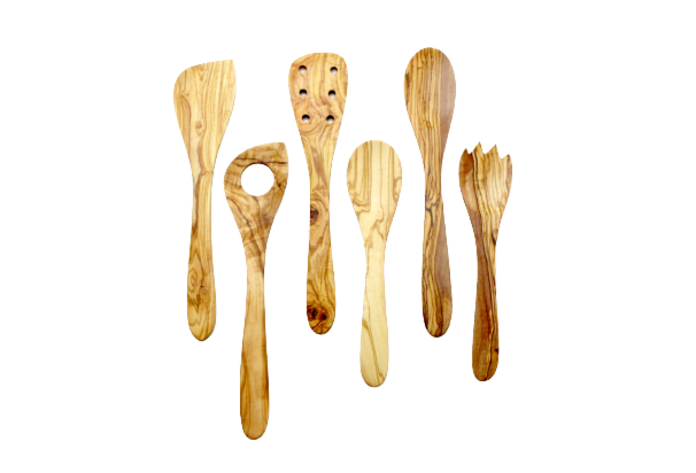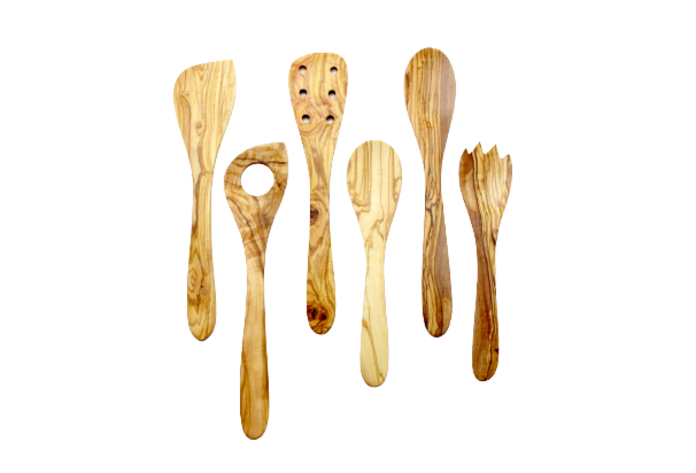Wooden Forks and Spoons
Set of Six Olive Wood Utensils
Set of Six Olive Wood Utensils
Couldn't load pickup availability
Materials
Materials
Olive wood, a hard, rich, durable, and beautiful wood that is sought after throughout the world, is produced from olive trees in Europe and eastern Africa, mainly in the countries on the southern and eastern coasts of the Mediterranean
The grain of east African olive wood has beenreferred to as "straight-grain" because the olive lumber pieces canbe perfectly aligned.
Olive wood has distinctively dark brown lines and yellowish-brown streaks and can be polished to a high shine. When olive wood is cut, it releases an aroma of freshness and sweetness into the air. This scent is particularly appealing and pleasant and can remain on a piece made with olive wood for many years to come.
Returns
Returns
RETURNS
We have a 100% customer satisfaction guarantee.
All products are returnable within 14 days of the item's delivery. To be eligible for a return, your item must be unused and in the same condition that you received it. Please contact us requesting a return before sending it back. Once return approval has been received, products must be returned within 14 days. You may email us at: customercare@woodenforksandspoons.com.
SHIPPING FOR RETURNS
To return your product, mail your product to:
MoDeLa Products LLC
Church Street Station
P.O. Box 1246
New York, New York 10008
United States
You will be responsible for paying the shipping costs for returning your item. Shipping costs are non-refundable. If your item is shipped internationally from one of our warehouses overseas, we may not approve your return request in some conditions or we may deduct the cost of international shipping from your refund.
Dimensions
Dimensions
Salad spoon and fork utemsils are 25 cm. in length.
All other utensils are 30 cm. in length.
Care Instructions
Care Instructions
How to Wash Olive Wood After Everyday Use
Although olive wood is naturally anti-bacterial, you should always wash it after everyday use. Spray the wood with warm water and gently apply a mild detergent to clear away any food particles. Rinse the detergent away and allow the wood to dry completely before using it again.
Never place olive wood products in a dishwasher. Olive wood is not dishwasher safe as the intense heat of the dishwasher can warp and damage the wood. Additionally, never leave olive wood products to soak in water for extended periods. The wood will begin to swell causing the grain to raise and the wood to crack. If your olive wood utensils ever become stained, you can quickly remove the stains by gently rubbing the wood with fine-grained sandpaper. Stains won’t penetrate deep into the wood and you can re-polish the damaged area after rubbing away the stain.
Do You Need to Oil Olive Wood?
As with most wood products, you should apply a thin coat of oil to your olive wood utensils to keep them healthy. Oiling the wood fills in its pores, keeping it protected, moisturized, and supple. As the oil absorbs into the wood, it oxidizes and hardens to become a part of the wood. This creates a non-greasy finish that protects the wood from water, stains, dust, and other contaminants.
If you forget to oil your olive wood utensils, they will eventually dry out and crack. Before they reach this point, though, you’ll notice the wood become dull and hazy. It may take on a dusty whitish appearance, signaling that it needs conditioning. Take the time to treat your wood before it reaches this point, and your olive wood utensils should last for years to come.
What is the Best Oil for Olive Wood?
Olive wood should be regularly conditioned with oil if you want it to last. That being said, not all oils work as well as others. To help you get the most life out of your olive wood products, we’ve compiled a list of some commonly used oils and appraised how well they work as olive wood conditioners.
1) Olive oil – When you think of olives, you probably think of olive oil. Many websites recommend olive oil for conditioning olive wood but it’s not the best choice. Olive oil and other common cooking oils can go bad over time, causing your olive wood to take on a foul, rancid aroma. If you use olive oil, make sure it is fresh and be wary of dark, sticky residues.
2) Beeswax – Beeswax is a thick, sticky substance naturally made by bees to create a honeycomb. It’s commonly used to condition olive wood cutting boards and leaves the wood shiny, varnished, and well hydrated. Beeswax is thicker than oil, meaning you don’t have to use it as
much, but it is not a vegan-friendly product. If you are vegan, do not use beeswax.
3) Refracted coconut oil – Coconut oil has become a hot topic in recent years for its health and beauty benefits. It’s also an ideal oil for conditioning olive wood. Standard coconut oil is rich in saturated fats that will eventually go bad, though, so always be careful to use refracted coconut oil. Refraction is the process of steam distilling the oil, removing excess saturated fat. It is shelf-stable and wood-safe.
4) Food-grade mineral oil – Also known as liquid paraffin, mineral oil is a non-toxic anti-drying product made from petroleum. It’s completely odorless, colorless, and won’t affect the flavor of your food. Mineral oils prevent olive wood from absorbing moisture, thus extending the life of your products. Not all mineral oils are food safe, though, so be careful to read the label before buying a product.
5) Carnauba – Carnauba is another common wax made from the leaves of a Brazilian palm tree. Since it comes from Brazil, Carnauba is also sometimes called Brazilian wax or the Queen of All Waxes. Carnauba leaves a beautiful glossy varnish and is highly water-resistant, making it popular with automobile detailers, cosmeticians, woodworkers, and
even dentists. Many commercial wood polishes include a mixture of carnauba, liquid paraffin, and beeswax.
We do not recommend using standard wood polish to treat your olive wood products. Most commercial wood polishes are toxic and will contaminate your foods. If you have consumed wood polish, contact poison control immediately and explain the situation.
How Do You Condition Olive Wood?
Conditioning olive wood might sound like a daunting task but it’s surprisingly easy and will only take a few minutes. Start by gathering the appropriate supplies and then follow
these quick steps:
1) Find a lint-free cloth or a small kitchen towel. Avoid using anything abrasive, such as a sponge or steel wool. These materials can scratch
your olive wood and invite bacteria into the gauges.
2) Apply a small amount of oil or wax to the cloth or towel.
3) Gently rub the oil or wax into the wood using small circular motions.
4) Continue to apply more oil or wax to your cloth as needed until the entire surface of the wood is covered in a thin layer of conditioner.
5) Allow the wood to sit for at least 12 hours.
6) If any oil or wax remains on the wood, wipe it away with a clean cloth or towel.
Avoid over-oiling your olive wood. You only need a thin coat of conditioner to restore the wood to pristine condition. If you over oil the wood, it can feel slick and greasy, making it hard to hold and use. Furthermore, don’t use the utensil until the oil has absorbed into the wood.


100% Satisfaction Guaranteed
If you are not completely satisfied, with your order for any reason, just return within fourteen-days and we will issue a full refund. No questions asked.

